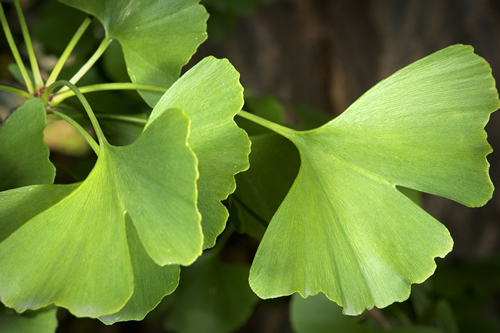Description
Botanical: Ginkgo biloba
Other common names: Maiden Hair, Fossil Tree
Ginkgo Biloba is the world's most used botanical remedy for memory loss and degenerative diseases of the brain and central nervous system. Because Ginkgo helps to enhance circulation of blood and oxygen to all parts of the body, the herb can be an effective overall tonic that aids in the management of a variety of conditions, ranging from impotence to ringing in the ears.
Country of Origin: United States
Beneficial Uses:
Ginkgo Biloba improves blood and oxygen flow to the brain and has been found to be helpful in cases senility, dementia, depression, anxiety, forgetfulness and inability to concentrate, and ADD (attention deficit disorder) in adults. Ginkgo's most exciting application may be in cases of Alzheimer's disease by helping to speed and increase the blood flow to the brain and aiding the brain to utilize glucose efficiently. Improved blood flow to the brain also helps to inhibit strokes, cerebral arteriosclerosis and other diseases of peripheral circulation. Available evidence demonstrates Ginkgo's efficacy in the management of "cerebral insufficiency" caused by impaired blood flow to the brain, which is thought to be secondary to arteriosclerotic disease, and characterized by impaired concentration, confusion, depression, fatigue, headache and dizziness.
With regard to Multiple Sclerosis, several East Coast (USA) university medical schools studied the effects of Ginkgo Biloba on functional measures in Multiple Sclerosis, and it appears that the patients using Ginkgo showed improvement in areas of depression, fatigue, symptom severity and functionality with no adverse events or side effects were reported. However, with respect to cognitive performance, a 2012 study from Oregon Health & Science University stated that there was no attention improvement in MS patients with cognitive impairment.
Ginkgo Biloba is a powerful antioxidant that helps to protect the brain from neurotoxicity. It is said to prevent free-radical damage and age-related declines in brain function. It may also prevent free radical damage in the kidneys and liver.
Ginkgo may reduce the risk of heart attack. In the same way improved blood flow helps other vital areas of the body, Ginkgo may prevent the blood clots that cause them. The herb blocks the platelet activation factor (PAF) that triggers the internal blood clots, which lead to heart attacks. In addition, one of Ginkgo's flavone glycosides (ginkgolide) has been used to help in cases of severely irregular heartbeat.
Problems associated with poor circulation, such as varicose veins, Raynaud's disease and macular degeneration have been alleviated with the use of Ginkgo Biloba. It is a circulatory stimulant that relaxes blood vessels. By increasing peripheral vascular circulation, the pain and cramping associated with obstruction and narrowing in the arteries (reducing blood flow) is relieved, and it is useful in cases of intermittent claudication (severe pain in calf muscles while walking). Improved blood circulation may also help inner ear dysfunction, including tinnitus (ringing in the ears).
Ginkgo helps promote good sexual health. Male impotence (erectile dysfunction) has been helped by the use of Ginkgo Biloba. Studies showed Ginkgo improved blood flow to the penis in men who had narrowing of the arteries that supply blood to that area and were unable to achieve erections. Additionally, women who suffered sexual difficulties when taking antidepressants have benefited from the use of Ginkgo, claiming that it enhanced orgasm and excitement.
Ginkgo is said to fight melanoma by improving the delivery of oxygen to tissues throughout the body. Oxygenated blood creates a hostile environment for hormone-related malignancy, including bladder, breast, ovarian, etc.
As an astringent, antifungal and antibacterial, Ginkgo helps to ward off kidney infections, diphtheria, dysentery, hemorrhoids and toxic shock, and has a beneficial effect on the urinary system, treating incontinence and excessive urination. It is also useful in treating vaginal infection.
Problems with the respiratory tract are thought to be improved with Ginkgo Biloba. This herb is said to be helpful in cases of bronchial constriction, asthma, chesty coughs (with thick phlegm) and tuberculosis.
Ginkgo Biloba has been known to provide relief for the symptoms of premenstrual syndrome, including fluid retention and breast tenderness.
Contraindications:
Speak with your doctor before taking Ginkgo Biloba Herbal Supplement if you are taking prescription MAO inhibitors (antidepressants) or blood thinners (aspirin, warfarin, etc.). Discuss its use before having surgery, if you are pregnant or if you take painkillers or anti-inflammatory medication or medication for swelling on a regular basis. It is not recommended for epileptics. Topical or internal use may cause skin irritations, mild headaches or mild upset stomach.


